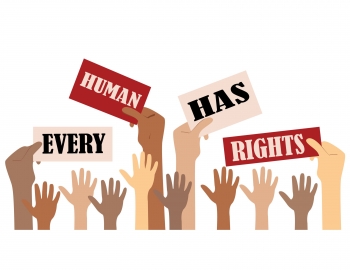
.png) Jaswant Kaur
Jaswant Kaur

By the time this article is published, the whole world, including India, would have celebrated the International Human Rights Day. Seventy-three years ago, the United Nations adopted and proclaimed the Universal Declaration of Human Rights (UHDR).
This document is just a few years older than the Indian Constitution. It upholds the rights of all human beings globally and expects the signatory countries to comply with the simple dictum “All human beings are born free and equal”. India, too, is one of the signatories of the UDHR.
The dictum is pure and divine. Yet, it is implemented with a half-hearted approach. The spirit of upholding human rights is only visible in public functions when government officials are requested for making special appearances or given a speaking opportunity during webinars.
During the last one week, several incidents would have sent shock waves across the country. One, a Catholic school in Madhya Pradesh was attacked in a fit of rage, without realising the fact that children studying in Christian schools are from all religions!
In fact, it is a dream for many educated parents to enrol their children in Christian schools for the value system and discipline they inculcate. As is the case with this writer, whose only son studies in a Christian school.
Two, the ministry of home affairs presented data compiled by the National Human Rights Commission, which showed a sharp decline in the number of human right violations consistently for the third year. The commission has registered 64,170 cases of human rights violations till October end this year. It registered 89,584 cases in 2018, 76,628 cases in 2019 and 74,968 cases in 2020.
Of course, this ignores the fact that a majority of such cases go unreported. What should have raised many eyebrows is the fact the Uttar Pradesh (UP) has topped the list for all these years! Alas, the government has been claiming that the law and order situation in the state has improved during the Yogi rule.
Three, if one looks at the World Inequality report 2022, India figures in the world’s most unequal countries with rising poverty and an “affluent elite”. The report shows that the top 10 per cent and 1 per cent hold 57 per cent and 22 per cent of the total national income respectively. In fact, 50 per cent of those who lie at the bottom of the pyramid have only 13 per cent share. They have an average national income of only Rs. 53,610 which is a little over $700!
The report also mentions that top 10 per cent had a share of 50 per cent of total national income during the British Raj. After Independence, this reduced to 35 to 40 per cent as many socialist policies were implemented. However, now it has crossed the pre-Independence levels.
This shows how genuine our governments have been when they give populist slogans like “Aam aadmi ke badhte kadam, har kadam par Bharat buland” or “India shining” or “Congress ka haath, aam aadmi ke sath”,or “sabka saath, sabka vikas, sabka vishwas” during elections. Another season of such slogans is round the corner.
The report also shows that private wealth in countries like India and China grew exponentially as they transitioned from regulated to free economies. In India, it grew from 290 per cent in 1980 to 560 per cent in 2020! No wonder Gautam Adani has become the richest person in India surpassing Mukesh Ambani despite the pandemic, when the whole world had a reduced source of income.
Four, a Bill, which has garnered attention is Trafficking in Persons (Prevention, Care and Rehabilitation) draft Bill 2021. The Bill is expected to be tabled in Parliament this session. The survivors of human trafficking have been demanding provision of funds for rehabilitation of survivors. They also want the investigation to be conducted beyond state borders and even countries.
They want the survivors to be given every chance of mainstreaming to the society. Is their demand not justified? After all, those who have already gone through the trauma of sexual, physical and mental exploitation, do have a right to lead a normal life just like any other human being. Is it not the responsibility of the government to support them in their daily struggle for survival? These questions certainly need a more structured thought.
Be that as it may, we as a country are not sensitive to the rights of fellow human beings. We prove this every day with the way our legislature, executive and the judiciary have been acting on matters that require more sensitivity than step-motherly treatment.
Several non-governmental organisations (NGOs) have faced the heat simply because they raised their voice against human right violations or they wanted a just and an equitable society. Their voices have been strangulated by imposing legal restrictions, simply because they dared to speak and act.
Is this the world we thought of when we sought independence from the British? Can we expect our elected representatives to act more responsibly? We need both the heart and the brain to work in tandem with each other to give meaning to what is called human rights.
(The writer, a company secretary, can be reached at jassi.rai@gmail.com)